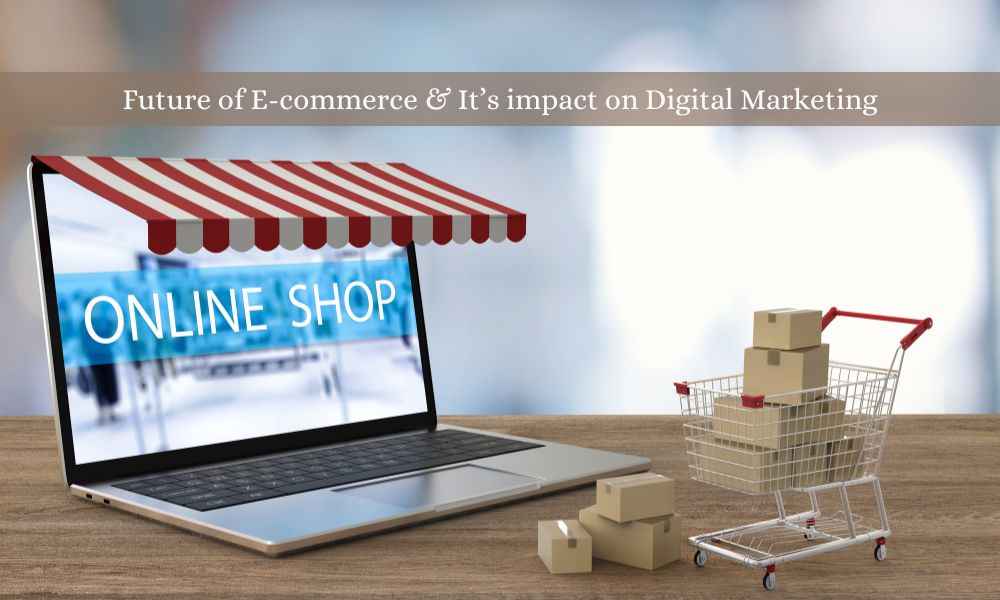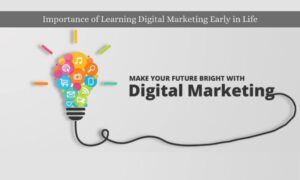Introduction
E-commerce has fundamentally reshaped the way we shop, offering convenience, variety, and accessibility that traditional brick-and-mortar stores can hardly match. As technology continues to advance, the future of e-commerce promises even more significant changes, with profound implications for digital marketing. Understanding these changes is crucial for businesses to stay ahead of the curve and maintain a competitive edge.
1. The Integration of AI and Machine Learning in E-commerce

AI and Machine Learning are at the forefront of e-commerce innovation. These technologies have revolutionized the way businesses interact with customers, providing personalized experiences that are more engaging and relevant.
AI in Customer Personalization
Artificial Intelligence enables businesses to analyze vast amounts of data and gain insights into consumer behavior. This allows for highly personalized marketing strategies, where products and content are tailored to individual preferences. For instance, AI-powered recommendation engines suggest products based on a user’s browsing history, purchase history, and even real-time behavior on the site.
Impact on Digital Marketing
For digital marketers, the integration of AI means more effective campaigns. Predictive analytics powered by AI can help in identifying trends and making data-driven decisions, ensuring that marketing efforts are not only timely but also highly targeted. Also, AI can automate repetitive tasks such as email marketing, freeing up time for marketers to focus on strategy and creativity.
2. Omnichannel Strategies: Bridging the Online and Offline Gap

Omnichannel retailing is becoming the standard in e-commerce, offering a seamless shopping experience across multiple channels, including physical stores, online platforms, social media, and mobile apps.
Evolution of Omnichannel Retail
The future of e-commerce lies in creating a unified shopping experience where customers can start their journey on one platform and complete it on another without any friction. For example, a customer might discover a product on social media, check its details on a website, and then purchase it in-store.
Digital Marketing Implications
Omnichannel strategies require digital marketers to ensure consistency in messaging and branding across all platforms. This involves integrating online and offline data to create a holistic view of the customer journey. Marketers must also develop content that can be easily adapted across different channels while maintaining a coherent narrative.
3. The Role of Augmented Reality (AR) and Virtual Reality (VR)

AR and VR are no longer futuristic concepts—they are increasingly being used to enhance the online shopping experience. These technologies offer immersive experiences that allow customers to interact with products in ways that were previously impossible.
AR and VR in E-commerce
AR enables customers to visualize products in their real-world environment, such as seeing how a piece of furniture would look in their living room before making a purchase. VR, on the other hand, offers fully immersive experiences, such as virtual store tours where customers can browse and select products in a 3D environment.
Implications for Digital Marketing
For digital marketers, AR and VR present opportunities to create engaging and interactive content. These technologies can be used to display products in dynamic ways, making online shopping more tangible and reducing the uncertainty that often accompanies purchasing products online. Marketers will need to innovate in this space, developing campaigns that leverage AR and VR to provide customers with memorable experiences.
4. Data Privacy and Ethical Marketing

As e-commerce grows, so do concerns about data privacy. With regulations such as the General Data Protection Regulation (GDPR) and the California Consumer Privacy Act (CCPA), businesses are under increasing pressure to handle customer data responsibly.
Importance of Data Privacy
Consumers are becoming more aware of their rights and are increasingly demanding transparency from businesses regarding how their data is used. In the future, data privacy will not just be a legal requirement but a key factor in building customer trust.
Impact on Digital Marketing
Digital marketers must prioritize ethical data practices, ensuring that all marketing activities comply with privacy regulations. This involves being transparent about data collection methods and offering customers clear choices about how their data is used. Marketers will also need to adopt a privacy-first mindset, creating campaigns that respect customer privacy while still delivering personalized experiences.
5. Sustainability and E-commerce: A New Era of Conscious Consumerism

Sustainability is becoming a significant concern for consumers, and this trend is expected to shape the future of e-commerce. As awareness of environmental issues grows, customers are increasingly looking for brands that align with their values.
Rise of Sustainable E-commerce
Businesses that adopt sustainable practices, such as using eco-friendly packaging or offering carbon-neutral shipping options, are likely to appeal more to environmentally conscious consumers. Additionally, transparency in supply chains and ethical sourcing of materials will become critical factors in customer decision-making.
Digital Marketing Implications
Digital marketers must highlight a brand’s commitment to sustainability in their campaigns. This involves creating content that not only promotes products but also educates consumers about the brand’s environmental and ethical practices. Marketers will need to build narratives around sustainability, positioning their brands as leaders in this space to attract and retain conscious consumers.
Conclusion:
The future of e-commerce is rapidly evolving, driven by advancements in technology, changing consumer behaviors, and growing concerns about privacy and sustainability. For digital marketers, this means staying adaptable and innovative, leveraging recent technologies, and adopting ethical practices to stay relevant in an increasingly competitive landscape. As e-commerce continues to transform, digital marketing will need to evolve alongside it. By embracing these changes, businesses can not only meet the challenges of the future but also capitalize on the opportunities it presents.
If you’re looking to stay ahead in this rapidly evolving digital landscape, consider enrolling in a Digital Marketing Course in Dadar at Moving Digits. Our institute offers hands-on training in the latest trends and technologies, giving you the skills to succeed in e-commerce and digital marketing. We recently held an Amazon Workshop that provided insights into successful e-commerce strategies, helping participants leverage the platform for business growth. Take a look at our workshop glimpses:
Article Credit- Chetan Pujari, Student of Advanced Digital Marketing Course.









